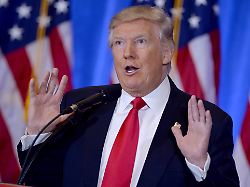Free expression?
This is how Trump’s lawyer wants to defend the ex-president
08/06/2023 06:27 p.m
In the 2020 presidential election, Trump speaks of electoral fraud and incites his supporters. They then storm the US Capitol. The former president now has to answer for this in court. His attorney already has a defense strategy. He insists on the right to freedom of expression.
The lawyer for ex-US President Donald Trump has set out his defense strategy in view of the allegations against his client, emphasizing the importance of the right to freedom of expression. Trump must be proven beyond a doubt that he had criminal intentions when he protested the results of the 2020 presidential election, John Lauro told CNN in an interview. Doing so is covered by the right to free speech protected by the US Constitution, he stressed. Lauro is representing Trump in the ongoing investigation into attempted voter fraud and the storming of the US Capitol on January 6, 2021.
Law enforcement accuses the ex-president of leading a conspiracy against the state. Trump lost the 2020 presidential election to Democrat Joe Biden. He never admitted his defeat, however, and has since spread false claims that he was robbed of a victory through electoral fraud.
At the time, Trump and those around him tried various ways to subsequently overturn the result. The campaign against the outcome of the election finally culminated on January 6, 2021, when violent Trump supporters stormed the House of Representatives in Washington.
At the indictment hearing last Thursday, Trump pleaded “not guilty.” Lauro went on to say that political freedom of speech allows not only to stand up for a position, but also to take action. You can even ask the Vice President to interrupt a process. At the time, Trump openly called on his deputy Mike Pence, who chaired the January 6, 2021 congressional session in his role as vice president, to block the procedure for confirming Joe Biden’s election victory. Asking someone to do something is not an act, but a free expression of opinion, he argued. There was no conspiracy against the state.
